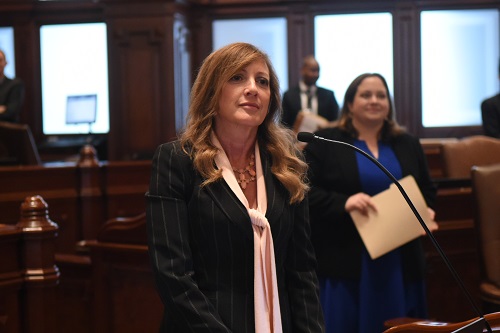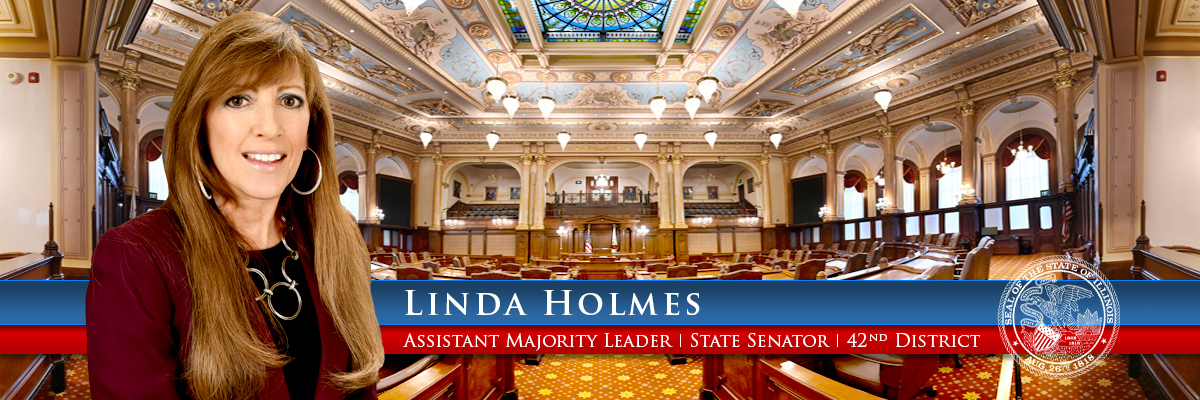- Details
- Category: News
SPRINGFIELD – The Illinois Senate voted today to override Gov. Bruce Rauner’s veto of the legislature’s school funding reform measure. State Sen. Linda Holmes, D- Aurora, was one of the senators to cast a vote against the changes put forth by the governor.
“Today, my colleagues and I voted against chaos, uncertainty and divisiveness by overturning Governor Rauner’s veto of an education funding reform effort,” Holmes said. “After 20 years of work toward a fairer funding model, we are closer than ever to an equitable system that gives millions of dollars in new funding to every school district in the state without creating winners and losers among schools.”
According to estimates from education funding reform advocates, schools in Holmes’ district would stand to gain millions of dollars under the Senate’s version of the proposed education funding law. Aurora East Unit School District 131 would gain over $13 million, Indian Prairie Community Unit School District 204 would gain over $800,000 and Oswego Community Unit School District 308 and Aurora West Unit School District 129 would both receive over $4.7 million in new funding.
Another provision contained in Rauner’s veto would punish municipalities for using tax increment financing districts (TIFs), a tool commonly used by local governments to alleviate blight and create jobs. Rauner’s modifications would account for TIF revenue that is usually unavailable to school districts when dedicating funds, which would result in school districts in municipalities that use TIFs receiving less money from the state.
“The governor reached well beyond the scope of this legislation to include this harmful, anti-business provision in his veto, which makes little sense after all of his talk about bringing good jobs to Illinois,” Holmes said.

- Details
- Category: Latest
SPRINGFIELD – Gov. Bruce Rauner has signed into law a bill banning the use of elephants in traveling exhibitions including circuses. The measure was sponsored by State Sen. Linda Holmes, D-Aurora.
“African and Asian elephants are endangered species,” Holmes said. “Traveling circuses are not able to properly care for elephants and as a result, elephant exhibitions in Illinois have been found to be in violation of the Federal Animal Welfare Act several times. Allowing these inhumane practices to continue would be irresponsible and poor stewardship of such impressive animals.”
Supported by the Humane Society, the ban on traveling elephant exhibitions will put an end to a practice that has been dying out in recent years due to pressure from the public. The legislation would ban elephants in traveling exhibitions. It would not ban elephants in zoos or any other permanent institution that ensures adequate conditions for the animals.
"For too long, elephants used in circuses have endured cruel training, constant confinement, and deprivation of all that is natural to them,” said Marc Ayers, state director for The Humane Society of the United States. “The public has come to see that these animals are victims, not willing performers. Illinois has taken a monumental step in ending this outdated form of entertainment and we urge other cities and states to follow suit.”
Senate Bill 1342 was signed into law by Gov. Rauner on Friday. The law will take effect starting January 1, 2018.

- Details
- Category: Latest
SPRINGFIELD – Aurora would be punished for its economic development efforts if Gov. Bruce Rauner’s amendatory veto of Senate Bill 1 is approved by legislators.
“Bruce Rauner has achieved what was once thought unachievable. With the stroke of a pen, he stirred up havoc for both small businesses and public schools across Illinois” Holmes said.
Under Rauner’s plan, special economic development funds known as Tax Increment Financing districts (TIFs), would be counted against the state support school districts receive. Because school districts generally don’t have access to TIF revenue, they would effectively receive less state funding because communities with TIFs would appear to have more available resources than they can access.
Rauner’s short-sighted plan, which was only exposed this week, punishes Illinois communities in need of both economic development and increased state investment for schools.
“It’s remarkable that Bruce Rauner is championing a plan that not only reduces funding for schools, but also handicaps incentives to create jobs in virtually every Illinois community,” State Senator Linda Holmes (D – Aurora) said. “By penalizing communities for using available tools to fight blight and improve the business climate, Rauner yet again reveals his commitment to pitting neighbor against neighbor while creating uncertainty in public institutions.”
Rauner’s amendatory veto penalizes hundreds of Illinois communities who desperately need adequate education funding and aggressive economic development tools. Aurora currently has seven TIF districts.
Because Rauner has kept the details of his plans quiet from lawmakers and the media until this week, it is unclear how much state investment Aurora potentially loses out on. Holmes says it has little merit while students, parents and schools need the stability to open – and stay open – within days.
For a full listing of TIF districts throughout Illinois, click here:
- Details
- Category: Latest
SPRINGFIELD – State Sen. Linda Holmes, D-Aurora, issued the following statement in response to Gov. Bruce Rauner’s veto of Senate Bill 1, an education funding reform measure:
“Today, Governor Rauner allowed partisan extremism and political grudges to get in the way of doing the right thing when he vetoed Senate Bill 1. If passed, this bill would increase state funding for every school in Illinois by sending funding to districts where it is needed most according to a data-driven formula. A month ago, the Rauner administration claimed to be in support of 90 percent of this bill, which is more than most parties to any compromise get.
“Schools in my district will be forced to close as soon as the end of October if Senate Bill 1 does not become law. It is time for the General Assembly to come together and get this passed so that schools can open this fall and remain open all year.”
More Articles …
Page 67 of 96




